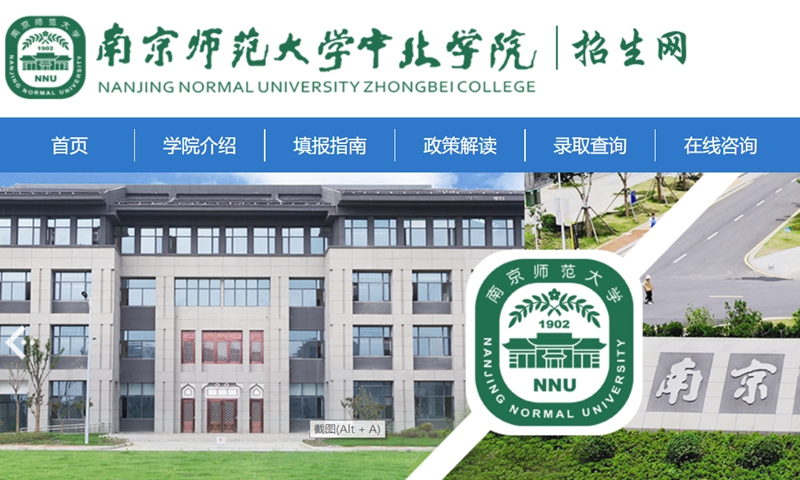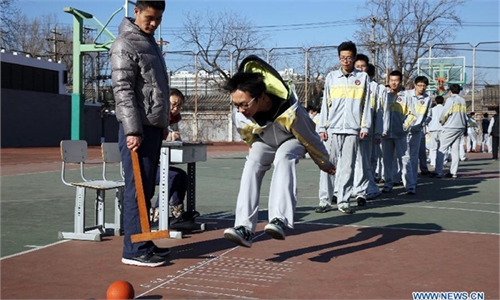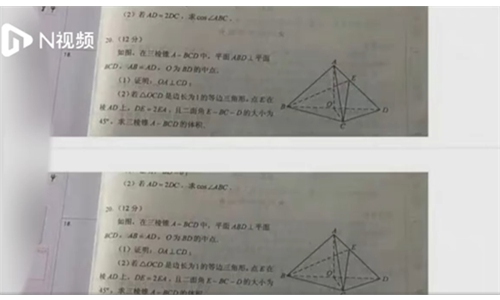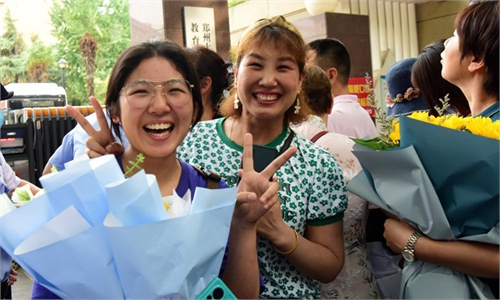Independent college reform plan in E China hits roadblock as students worry their degrees may be 'downgraded'

Photo: Screenshot of website of Nanjing Normal University Zhongbei College
UPDATE 6/9 10:00 am:Four provinces - Jiangsu, Zhejiang, Shandong and Jiangxi - have announced they will suspend a plan to merge independent colleges and vocational institutes amid dissatisfaction among students and parents who are worried that the degrees may be "downgraded" as a result.
The Ministry of Education said on Sunday that the independent colleges will still offer general bachelor's degrees for their current students, as was promised when they enrolled.
Educational authorities in East China's Jiangsu Province decided to suspend the plan to merge independent colleges and vocational institutes after thousands of students submitted a petition against the plan for fear of losing their competitiveness in the job market.
The police in Zhenjiang reported on Tuesday that the students at Zhongbei College of Nanjing Normal University gathered on campus on Sunday to express their opposition to the college's decision to merge with a vocational institute. The students illegally detained the dean of the college, surnamed Chang, who came to the students to explain the situation. The students held Chang for more than 30 hours until he was freed by the police and taken to the hospital, according to a local police announcement.
Protests also erupted in other four colleges in Jiangsu in the past few days with some events of physical confrontation, students at the scenes told the Global Times.
The Jiangsu Education Department announced on Monday evening, one day after students at the Zhongbei College of Nanjing Normal University detained the dean, that it suspended the decision to merge colleges and vocational institutes.
Zhongbei College also stated on Tuesday that it will terminate the merge with vocational institutes.
As of Tuesday afternoon, protests had stopped in the five colleges as the students wait for a response from the colleges, the Global Times has learned.
The institutions involved in the merger fiasco are all independent colleges. Independent colleges are often affiliated with top universities but have separate admissions processes from their parent universities. These colleges often have higher tuition fees but lower admission scores.
For example, Nanjing Normal University's minimum admission score in 2020 was 603, but its affiliated Zhongbei College had a minimum admission score of 326, according to education information website eol.cn. The annual tuition fee of Zhongbei College is about 15,000 yuan ($2,474), while the annual tuition of its parent university, Nanjing Normal University, is about 5,000 yuan ($781).
Supporters of independent colleges believe they expand China's higher education resources and help more Chinese students receive college education. But critics of independent colleges claim they are means of fund raising for parent universities. However, because they offer diplomas and undergraduate degrees affiliated with top universities, many students are willing to enroll.
Amid criticism toward independent colleges, the Ministry of Education (MOE) required these institutions to operate independently from their parent universities, as well as to offer different diplomas. In 2020, the MOE issued an announcement requiring further restructuring of independent colleges across the country which suggested the merge of independent institutions with vocational institutions.
If independent colleges merge with higher vocational and technical schools they will become ordinary higher vocational schools. Although they would still be universities and offer undergraduate degrees, the undergraduate degrees would become "professional bachelor's degrees" instead of the usual bachelor of arts and bachelor of science degrees. Most students and parents see this as an "obvious downgrade" and believe that it will greatly reduce the competitiveness of students in the job market after graduation. Therefore, plans to merge independent institutions with vocational institutions have been unpopular among students and parents.
Students of the five colleges involved told the Global Times on Tuesday that they want a complete termination, not a temporary suspension, of the merger.
A number of students told the Global Times that they are unsatisfied with the way the colleges have dealt with the matter. These colleges failed to thoroughly negotiate the possible merger with the students as they had promised, students said.
Teaching staff mentioned in March that the school was going to experience a systemic reform but did not mention any details about the merge with a vocational institute, a student told the Global Times.
At the beginning of June, the school suddenly announced that it was going to merge with a vocational institute and that their degree would become a vocational undergraduate degree, said the student. The decision did not take into account the students' opinions as only very few students participated in the consultation.
A petition letter on the matter, signed by students from the five colleges and sent to the Global Times, says students refused to downgrade from a general undergraduate degree to a professional undergraduate degree. They also asked that all students and parents must be informed of the subsequent transfer plan.
It is an unavoidable trend to reform independent colleges, Xiong Bingqi, Director of 21st Century Education Research Institute in Beijing, told the Global Times.
"However, such reform requires extensive listening to the opinions of faculty and students," Xiong noted, "Only a reform that has the support of faculty and students can move forward smoothly."
Neighboring Zhejiang Province also made a clear statement calming students' worries. On Saturday, the province's education department said it decided to suspend the merge of all independent colleges with vocational institutes and promised that current students can receive a general undergraduate degree as was promised when they were admitted.
Currently, vocational education still needs further development as part of higher education in China. Xiong pointed out that the merge of independent and vocational institutes has been met with opposition from students and parents, who believe that a vocational bachelor's degree is lower than a regular bachelor's degree. This idea has become deeply ingrained.
"If we are to truly promote vocational education in China, a complete change of mindset is needed," Xiong said.



